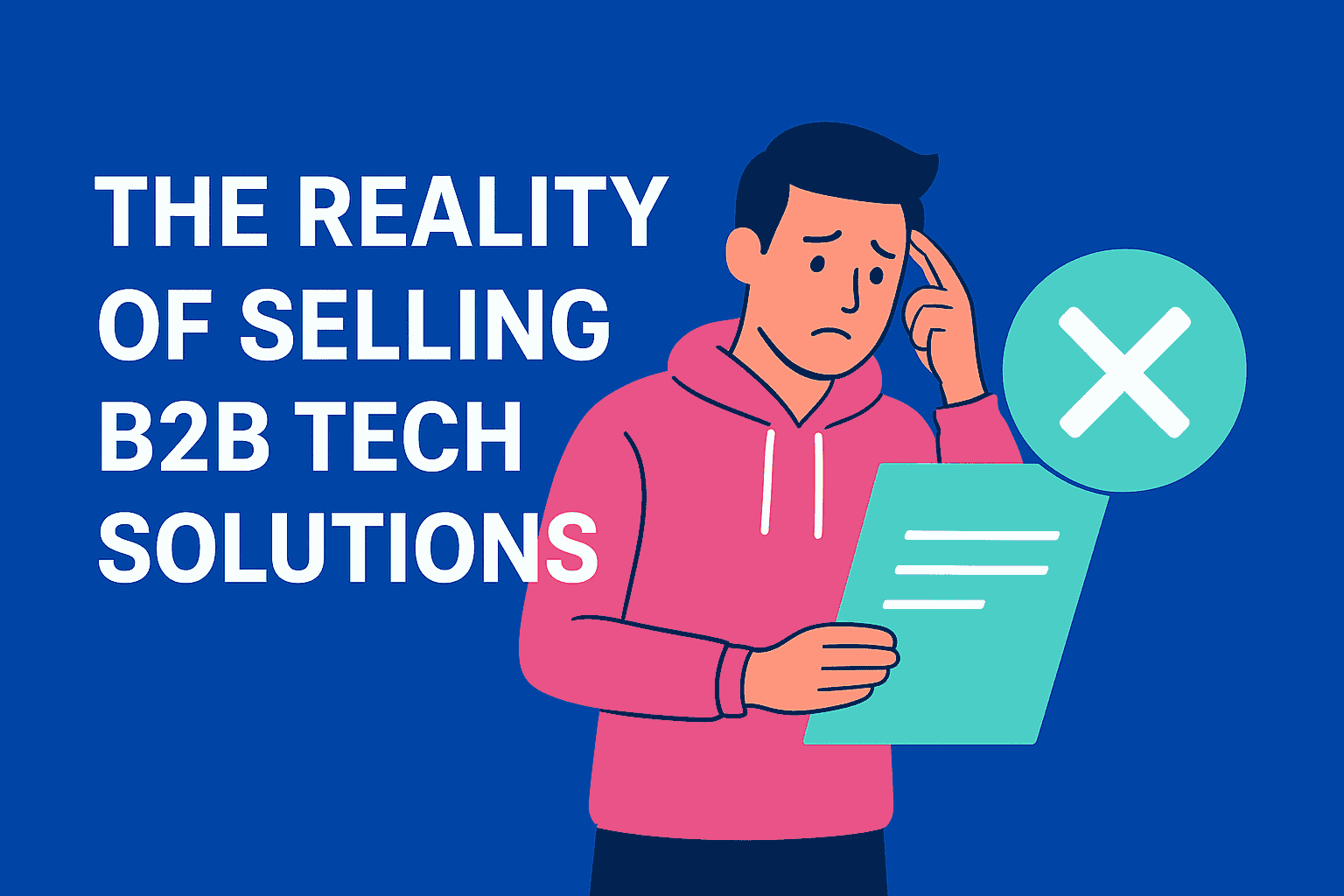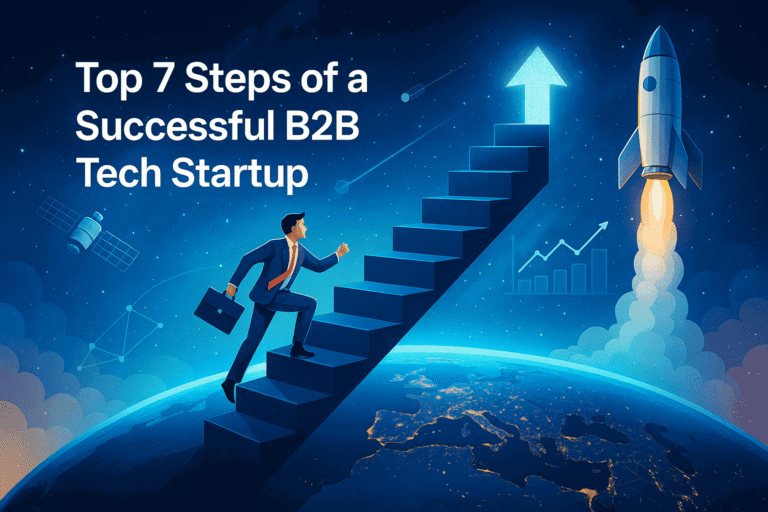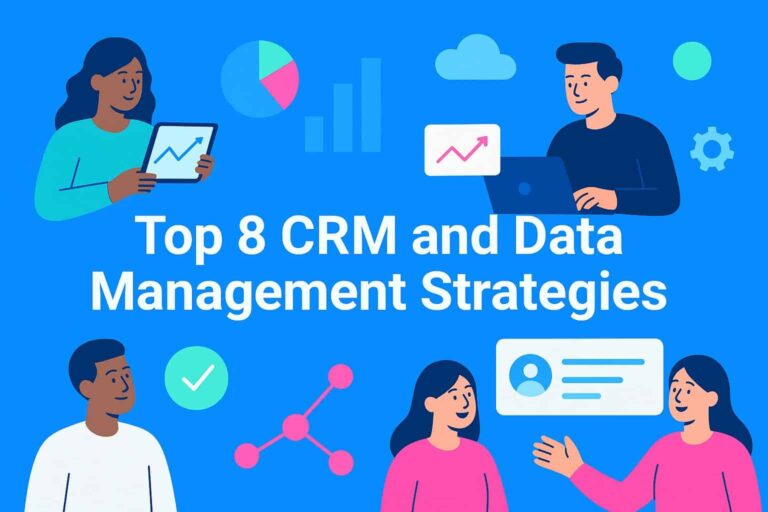Tech Founders Don’t Understand Sales…
Unfortunately, many tech founders think they can trade on their ego and personality, which would need more than luck. They regard their solution as so technically superior, and therefore compelling, no prospect could ever turn down their ill-conceived sales pitch, provided they can understand it. Most tech founders have never had to work in B2B sales. This is why startups need an experienced marketing team to create meaningful messaging and salespeople to close the deals. Getting a deal of any financial significance over the line is like Moses parting the waters for any startup. Lead times can be long, due diligence is rigorous and internal buying teams have complex governance structures and processes that you must understand and adapt your sales process accordingly. B2B sales is the single hardest thing a startup must do, which is why good salespeople are a coveted resource.

Increase Headcount or Invest in Marketing?
When confronted with the option of investing in marketing to help boost sales or hiring another software developer, tech founders with developer backgrounds are more likely to hire another hoodie-wearing techie. Hoodies don’t grow businesses; they are a cost, not an investment with a potential return. Investing in marketing to grow your brand and revenues on the other hand, is not only necessary but fundamental to stimulate growth. Some of this may seem obvious but then why do so many startups stagnate and then fail? Tech founders be warned, you can be your own worst enemy if you do not prioritise marketing and support your sales.
Grow Your Brand
Growing your brand involves a range of marketing activities designed to increase brand awareness, engagement and loyalty. In fact, everything marketing does goes in some way to increasing brand awareness. It’s for this reason investing in marketing is your number one priority, but your brand spreads beyond discreet marketing activities, like lead generation, events, social media, advertising, PR etc., and is the combined result of all these efforts. Each activity will do its bit to push market momentum. You must maximise the impact of each individual activity so that together they provide a foundation on which to engage your audience and continue to tell your story.
Build Market Momentum… and Never Stop!
The more you talk to customers and prospects the more you build awareness about your company, your purpose and your products. Everyone in the business has their part to play in this, whether that is supporting customers, talking to prospects or being active on social media. Employee and customer advocacy are key components in sharing your story with a wider audience. Building a brand takes both investment and time but for the best results you must be committed to the long game and remain consistent. You can never stop. Any awareness you create will soon evaporate if you get distracted and don’t maintain a presence before you have established a foothold in your target market. You must always seek to be front of mind in your prospects because all your interactions, or lack of them, matter.
A Simple 3 Stage Sales Process
1. The Value Proposition Comes First
When selling B2B tech solutions, the number one priority is making the value proposition crystal clear. Too many startups fall into the trap of leading with technical features or jargon, forgetting that buyers are motivated by business outcomes that create value for them and their investors/owners. A clear value proposition translates the solution you sell into a relevant story with tangible benefits: saving money, reducing risk, increasing efficiency or unlocking new revenue streams. In the early days, the message should always answer the simple question every prospect has in mind: Why does this matter to me right now?
2. Building Trust and Credibility
Credibility is the currency that fuels growth for B2B tech startups. Large organisations are naturally cautious when considering a new vendor, so anything that reduces their perceived risk of doing business with you is critical. This means gathering proof points early, whether that’s case studies, testimonials, a pilot project or strong advisory backing. It also includes showing that security, compliance and reliability have been taken seriously from the start. Every signal you send either builds or erodes trust, and trust is what allows a buyer to take a chance on an unfamiliar name.
3. Mapping the Sales Process
Selling into other organisations is rarely a one-meeting affair. The process usually involves multiple stakeholders, layers of decision-making and the need for relationship-building over time. Tech startups must understand who the decision-makers and influencers are, and tailor communication to each one. This is where consultative selling becomes invaluable: helping prospects clarify their challenges, not just pitching a product. In the early stage, founder-led sales can make a huge difference, as the founder carries both authority and authenticity in conversations with potential buyers.
Your Tech is Not Even Half the Story
For startups selling B2B tech solutions, success depends on more than just the brilliance of the solution. It’s about crafting a compelling value story, proving credibility at every turn and working carefully through a complex and multi-layered sales process. Mastering these three areas ensures that even without a big brand name, a startup can earn the trust of enterprise customers and set the stage for healthy sales engagements that give you a chance against the established competition. All you want is to have the same opportunity to present your case that other more established vendors may automatically get. Many startups fail at this initial hurdle because they are not well known and lack any market pull. This is why once you get the chance to present your proposition, it must be so compelling the prospect is already thinking about arranging the next meeting with the key people that need to be involved to progress the conversation.
You may want to read: “Why B2B Tech Startups Must Invest in Marketing.”







